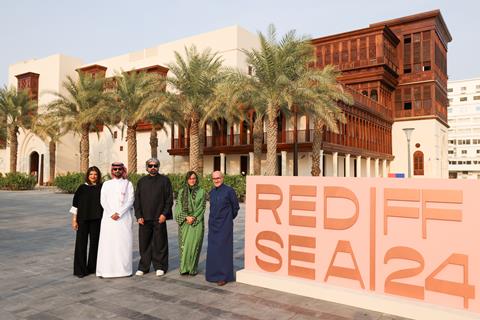
‘The New Home Of Film’ is the theme of the fourth edition of the Red Sea International Film Festival (RSIFF), which runs from December 5-12 in the Saudi port city of Jeddah.
The theme speaks directly to the festival’s move to a new venue in the historic Al-Balad district of Jeddah, and indirectly to Saudi Arabia’s growing influence in both the Middle East and international film industries.
Famed for its traditional houses with wooden windows and balconies, Al-Balad in central Jeddah was Red Sea’s home for its first edition before it decamped to a temporary base at the luxurious Ritz-Carlton hotel by the shores of the Red Sea. Since then, a new festival centre (the Cultural Square) has been created in Al-Balad. Built in the traditional Al-Balad style, it has five cinemas and an auditorium and will host the festival’s screenings and premieres.
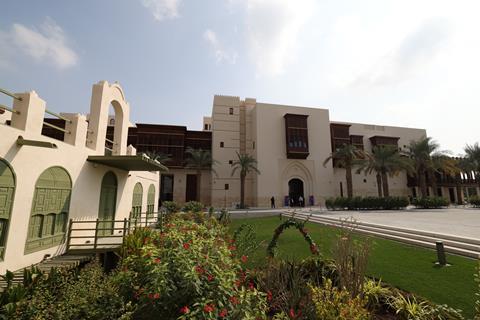
“It’s a gorgeous space and the great thing is that everything is contained and together,” says Shivani Pandya Malhotra, RSIFF managing director. This is a big change from the past two years; some premieres and industry activities took place at the huge Ritz Carlton hotel but many screenings were a 20 minute drive away at a Vox Cinemas multiplex.
This year, the festival’s market – the Red Sea Souk – is a ten-minute walk from Cultural Square in a large ‘pop-up’ in front of the Old Town. Junkets and initiatives such as the Red Sea Labs will take place in restored Al-Balad houses, while panels and masterclasses will be in the festival’s industry zone nearby. A small park has also been converted into a hangout garden space for the festival.
Trade hub
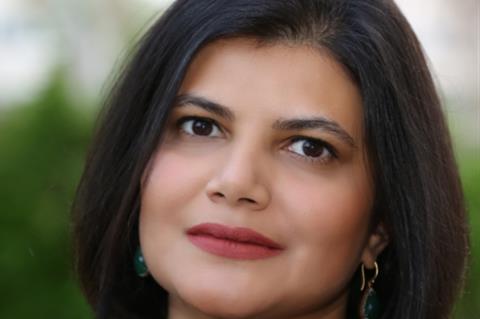
Pandya Malhotra explains that Al-Balad was historically a key trade hub where people from all over the world met and did business. “There was a huge mix of cultures. And I believe that is what we portray at the film festival and at [parent organisation] the Red Sea Film Foundation – it’s really the home for cinema because we are getting everybody together to tell their stories.”
That certainly happened last year. Red Sea attracted a legion of stars, among them Johnny Depp, Zoe Saldana, Will Smith, Chris Hemsworth, Halle Berry, Gwyneth Paltrow and Nicolas Cage.
Many international execs also go to Red Sea to learn about the local industry, which offers a 40% tax credit for international features and is generously supported by the Saudi government.
The Red Sea Foundation’s development and funding programmes – such as the Red Sea Fund and Red Sea Labs – have also backed a new generation of filmmakers from Saudi and the MENA region. Among them is Tawfik Alzaidi whose 2023 film Norah was the first ever Saudi film to make Cannes Film Festival’s official selection as part of the Un Certain Regard sidebar.
On a wider level, Saudi Arabia has poured investment into the film industry including studio complexes in Neom and Alula. A $100m Saudi Film Fund launched in September to invest infrastructure and investment. A huge number of cinema have also been built; the country now has around 612 screens. Some of the initial excitement about the Saudi market has now faded and its box office has plateaued for the past two years, but it still accounts for 42% of theatrical takings in the Middle East region.
Changing climate
All this means that the conversations about the festival have changed dramatically from its first edition, when the country was just starting to open up. It is easy to forget that Saudi Arabia only ended its 35-year ban on cinemas in 2018 as part of the Kingdom’s Vision 2030 plan to diversify its economy away from oil and transition the country towards a more moderate form of Islam. Many wondered if it was even safe to travel to Saudi. The aftermath of the 2018 assassination of journalist Jamal Khashoggi also cast a long shadow.
“There’s always questions when there is the unknown,” says Pandya Malhotra, reflecting on the festival’s journey since its first edition. “Nobody had really been to Saudi before. And that has changed quite dramatically in the last four or five years. People have come and seen Saudi for themselves. There has been a lot of positive word of mouth that has gone out, and people know it is real and there is a huge creative community here. People are seeing our films, they are seeing the filmmakers travel and they are seeing co-productions happening.”
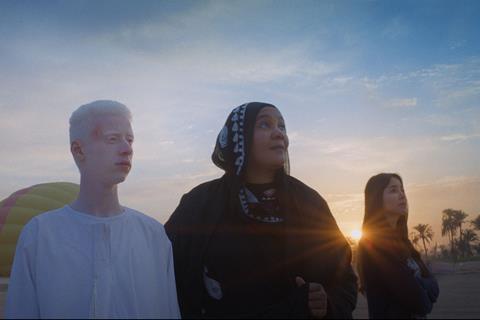
She cites the opening film of this year’s festival The Tale Of Daye’s Family, an Egyptian-Saudi co-production by Egyptian filmmaker Karim Shenawi. It’s the story of an 11-year-old Nubian albino boy who faces adversity due to his unique appearance and who gets a chance to audition for an Egyptian version of talent show The Voice.
Pandya Malhotra says the film is a “perfect representation of where the region is headed and what is happening here. Partnerships are being made and showing a co-production between Egypt and Saudi is fabulous for us.”
She says that 50% of the 121 films playing at Red Sea are either world or international premieres, calling the festival a “place of discovery where people are going to come and see the films for the first time.”
She is also proud that seven out of the festival’s 16 films in competition are directed by women, a figure that compares favourably with many Western festivals. Among them are Indian director Reema Kagti’s comedy Superboys Of Malegaon, Egyptian director Taghrid Abouelhassan’s Snow White and the Red Sea-funded To Kill A Mongolian Horse by Xiaoxuan Jiang.
Adding Asia
The competition has traditionally programmed films from Asia like To Kill A Mongolian Horse alongside Arab world and Africa. But this year marks the first time that Red Sea’s Souk market has included Asia in its offering.
The Souk’s Project Market will see 38 feature film and television projects pitched during the festival from the likes of Afghanistan, Pakistan, China and the Philippines as well as the Arab world and Africa. “Our strategy has always been to become a platform for Africa, the Arab world and Asia,” says Pandya Malhotra, who says that 14 past projects that have been made and secured theatrical releases.
The Souk also offers panel discussions and masterclasses as well as a Talents programme for up-and-coming talent. At the heart of the Souk is the exhibition space; some 75 exhibitors are booked in this year, up from 60 last year.
Pandya Malhotra is keen to set the film festival with the context of parent organisation the Red Sea Foundation, which also oversees funding initiative Red Sea Fund, development programme Red Sea Labs and the Red Sea Souk market.
The Labs includes The Lodge programme in partnership with TorinoFilmLab, which mentors up and coming filmmakers, and the SeriesLab, in partnership with Film Independent, to support writers and creators from the Arab world, Africa, and Asia in developing and pitching their TV series.
With a budget of $15m, the Red Sea Fund has so far supported over 250 projects with grants since launching in 2021. Notably, seven films shortlisted for the 2024 Oscars were supported by the Red Sea Fund, including Kaouther Ben Hania’s Four Daughters, submitted by Tunisia, Mohamed Kordofani’s Goodbye Julia (Sudan), and Amjad Al Rasheed’s Inshallah A Boy (Jordan). Four Red Sea Fund-backed titles played at Cannes this year and six at Venice.
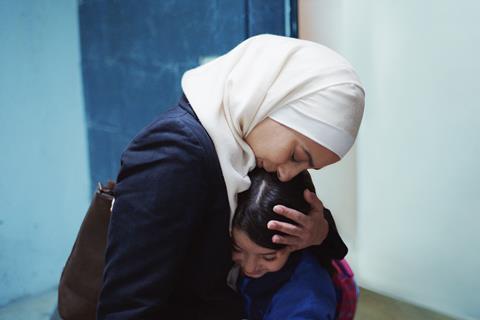
Some, like Cannes Critics’ Week title Inshallah A Boy, came through the Red Sea Labs before being backed by the Red Sea Fund and then being showcased at the Red Sea Festival itself.
“For me, the Lab enables, the Fund empowers, the Souk activates, because all the films are being pitched out, and then you’ve got a celebration that comes together at the Festival,” says Pandya Malhotra. So it’s literally year round support for different aspects of the ecosystem through the Foundation.”
Star turns
She promises that a number of stars will once again travel to Jeddah for the festival among them Johnny Depp who will present his Red Sea-fund backed Modi – Three Days On The Wing Of Madness. It’s an important aspect of the event, she stresses, not only for integrating the international industry with the Saudi and MENA film sector, but also for allowing local audiences to meet with star names and for inspiring up-and-coming local filmmakers. Speakers lined up this year include filmmakers Michael Mann and Spike Lee and actors Eva Longoria, Viola Davis and Andrew Garfield. Lee was recently announced as head of the festival’s main jury.
Among the challenges for Red Sea, and indeed all festivals, are navigating the politics of the Middle East, in particular the ongoing conflicts between Israel and Hamas and Hezbollah. “Our approach is very simple,” says Pandya Malhotra. “We are a cultural event. We have a mandate to support the filmmaking community and filmmakers. We don’t have any agenda apart from enabling them and celebrating them.”
Could Red Sea showcase an Israeli film in its line-up? “That’s not a festival decision,” she says. “That’s the country’s political decision. For us, once everything gets normalised we will of course be able to. But at this point in time, there are limitations within the political situation within the region, and we obviously follow the laws and regulations the country has.”
On a wider level, will the Saudi government continue to support the Foundation and the festival as generously as it has? Pandya Malhotra says the objective has always been to transition towards greater private sector support “to make ourselves sustainable.”
“We’re well funded. I do believe that we just have to be smarter in the way we move forward and how we put our resources together. As the industry develops in the country, city and region, we will continue to get more support from them as we’ve established ourselves as a cultural event. We’re also getting support from people outside the industry and other entities that support culture. It’s a process.”












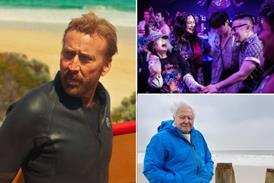





















No comments yet